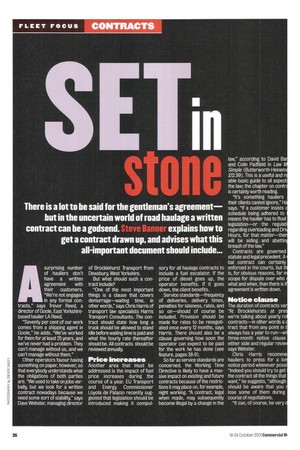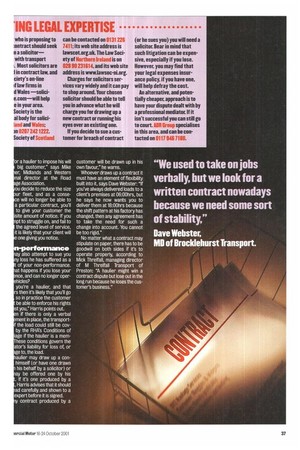A surprising number of hauliers don't have a written
Page 36

Page 37

If you've noticed an error in this article please click here to report it so we can fix it.
agreement with their customers. "We're not engaged in any formal contracts," says Trevor Reed, a director of Goole, East Yorkshirebased haulier LA Reed.
"Seventy per cent of our work comes from a shipping agent in Goole," he adds. "We've worked for them for at least 25 years, and we've never had a problem. They can't manage without us, and we can't manage without them."
Other operators favour having something on paper, however, so that everybody understands what the obligations of both parties are. "We used to take on jobs verbally, but we look for a written contract nowadays because we need some sort of stability," says Dave Webster, managing director of Brocklehurst Transport from Dewsbury, West Yorkshire.
But what should such a contract include?
"One of the most important things is a clause that covers demurrage—waiting time, in other words," says Chris Harris of transport law specialists Harris Transport Consultants. The contract should state how long a truck should be allowed to stand idle before waiting time is paid and what the hourly rate thereafter should be. All contracts should be reviewed annually.
Price increases
Another area that must be addressed is the impact of fuel price increases during the course of a year. EU Transport and Energy Commissioner Loyola de Palacio recently suggested that legislation should be introduced making it compul sory for all haulage contracts to include a fuel escalator. If the price of diesel goes up, the operator benefits. If it goes down, the client benefits.
Service standards—frequency of deliveries, delivery times, penalties for lateness, rates, and so on—should of course be included. Provision should be made for rates to be renegotiated once every 12 months, says Harris. There should also be a clause governing how soon the operator can expect to be paid for the work he has done (see feature, pages 38-9).
So far as service standards are concerned, the Working Time Directive is likely to have a massive impact on existing and future contracts because of the restrictions it may place on, for example, night working. "A contract, legal when made, may subsequently become illegal by a change in the law," according to David Ba and Colin Padfield in Law Simple (Butterworth-Heinem £12.99). This is a useful and r able basic guide to all aspect the law; the chapter on contr is certainly worth reading.
"It's something hauliers their clients cannot ignore," H says. "If a customer insists schedule being adhered to means the haulier has to flout legislation—or the regulat regarding overloading and Dri Hours, for that matter—the will be aiding and abettin breach of the law."
Contracts are governed statute and legal precedent. A bal contract can certainly enforced in the courts, but t is, for obvious reasons, far scope for dispute over who what and when, than there is i agreement is written down.
Notice clause
The duration of contracts va "At Brocklehursts at pre we're talking about yearly ro contracts—in other words a tract that from any point in t always has a year to run—wi three-month notice clause either side and regular revie says Webster.
Chris Harris recomme hauliers to press for a lo notice period whenever possi "Indeed you should try to get the contract all the things that want," he suggests, "although should be aware that you lose some of them during course of negotiations.
"It can, of course, be very or a haulier to impose his will big customer," says Mike er, Midlands and Western nal director at the Road ge Association.
ou decide to reduce the size ur fleet, and as a consece will no longer be able to a particular contract, you'll to give your customer the isite amount of notice. If you pt to struggle on, and fail to the agreed level of service, it is likely that your client will e one giving you notice.
n-perfornsance
lay also attempt to sue you ny loss he has suffered as a t of your non-performance. at happens if you lose your nee, and can no longer operehiclesP you're a haulier, and that rs then it's likely that you'll go so in practice the customer be able to enforce his rights St you," Harris points out, n if there is only a verbal ment in place, the transport f the load could still be coyby the RHA's Conditions of iage if the haulier is a rnemhese conditions govern the ator's liability for loss of, or ge to, the load.
haulier may draw up a conhimself (or have one drawn his behalf by a solicitor) or ay be offered one by his . If it's one produced by a , Harris advises that it should • ad carefully and shown to a expert before it is signed. y contract produced by a customer will be drawn up in his own favour," he warns.
Whoever draws up a contract it must have an element of flexibility built into it, says Dave Webster: "If you've always delivered loads to a client's premises at 06:00hrs, but he says he now wants you to deliver them at 18:00hrs because the shift pattern at his factory has changed, then any agreement has to take the need for such a change into account. You cannot be too rigid."
No matter what a contract may stipulate on paper, there has to be goodwill on both sides if it's to operate properly, according to Mick Threlfall, managing director of M Threlfall Transport of Preston: "A haulier might win a contract dispute but lose out in the long run because he loses the customer's business."












































































































































